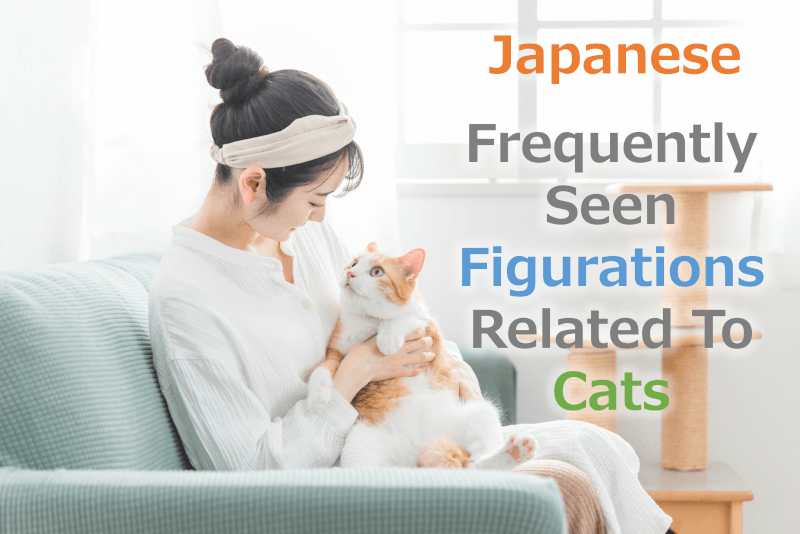Click here for the Chinese version
点击这里并查看中文版本
So many Japanese figurations (idioms) related to cats!
Cats and Japanese peoples' life are closely related.
Until a few years ago, Japanese people had been thinking cats came to Japan from China between Nara and Heian eras. The reason why the cats catch the mice that cats can protect the Buddhist sutra on the ship.
In 2011, cat's head bones have been discovered in Karakami ruins in Iki city, Nagasaki prefecture. This explains that cats are already in Japan around Yayoi era and protect the harvested rice.
In Heian era, nobles had cats as their pets. Cats and Japanese people's life have a long history.
- Yayoi era: Approx. 5th century B.C.
- Nara era: 710 A.D. - 784 A.D.
- Heian era: 794 A.D. - 1185 A.D. or 1192 A.D.
We can find a lot of descriptions of cats in Japanese figurations. Let me introduce some of these. Here we go!
The standard pronunciation of cat in Japanese is [neko]. "ねこ" in Hiragana and "猫" in Chinese character.
気になる内容にすぐに移動
Figurations related to cat’s body
猫舌
ねこじた
[neko jita]
Literal translation: Cat's tongue
- means "cannot eat hot (high temperature) food".
In fact, all animals cannot eat hot food, only humans do!
![猫舌(ねこじた) [neko jita] = Cat's tongue](https://blog.enjo.life/wp-content/uploads/2022/10/japanese-figuration-related-to-cats-en-nekojita.png)
猫背
ねこぜ
[neko ze]
Literal translation: Cat's back
- means hunchbacked.
In Chinese language, this is called "Camel's back" which is so confusing.
(In fact, cat's back is hunched as natural, healthy!)
![猫背(ねこぜ) [neko ze] = Cat's back](https://blog.enjo.life/wp-content/uploads/2022/10/japanese-figuration-related-to-cats-en-nekoze.png)
猫の額
ねこのひたい
[neko no hitai]
Literal translation: Cat's forehead
- means very small (or narrow) area
(I am not sure if cats really have forehead because the border between forehead and hair is unclear.)
猫の目
ねこのめ
[neko no me]
Literal translation: Cat's eye
- means "often changed". As you know the size of cat's pupil is often changed depending on the sunlight.
![猫の額(ねこのひたい) [neko no hitai] = Cat's forehead / 猫の目(ねこのめ) [neko no me] = Cat's eye](https://blog.enjo.life/wp-content/uploads/2022/10/japanese-figuration-related-to-cats-en-nekonohitai.png)
猫撫で声
ねこなでごえ
[neko nade goe]
When the cat wants to be coquettish, it makes a sweet meow.
There is also a saying, the sound of the owner when he loves the cat.
猫の手も借りたい
ねこのてもかりたい
[neko no te mo kari tai]
Literal translation: Want to borrow cat's hand
- means to being incredible busy, although the cat's hand is useless, but I still need help
(Actually, cats only have feet, no hands!)
![猫の手も借りたい(ねこのてもかりたい) [neko no te mo kari tai] = Want to borrow cat's hand](https://blog.enjo.life/wp-content/uploads/2022/10/japanese-figuration-related-to-cats-en-nekonote.png)
猫足
ねこあし
[neko ashi]
Literal translation: Cat's feet
- means "walking quietly like a cat".
So cute cat pads are useless for us humans.
猫の尻尾
ねこのしっぽ
[neko no shippo]
Literal translation: Cat's tail
- means dispensable thing.
However, in fact, the cat's tail is very important!
Figurations related to cat’s personality and behavior
借りてきた猫
かりてきたねこ
[karite kita neko]
Literal translation: Borrowed cat
- means quiet appearance, because cats are not easy to adapt to new environment.
![借りてきた猫(かりてきたねこ) [karite kita neko] = Borrowed cat](https://blog.enjo.life/wp-content/uploads/2022/10/japanese-figuration-related-to-cats-en-karitekitaneko.png)
猫を被る
ねこをかぶる
[neko wo kaburu]
Literal translation: Wear cat (put cat on)
- means pretending "borrowed cat" mentioned above.
猫に小判
ねこにこばん
[neko ni koban]
Literal translation: Give cat gold coin
- means not to understand how valuable it is.
![猫に小判(ねこにこばん) [neko ni koban] = Give cat gold coin](https://blog.enjo.life/wp-content/uploads/2022/10/japanese-figuration-related-to-cats-en-nekonikoban.png)
猫にまたたび
ねこにまたたび
[neko ni matatabi]
Literal translation: Give cat silver vine (Actinidia polygama)
猫に鰹節
ねこにかつ(お)ぶし
[neko ni katsu(o)bushi]
Literal translation: Give cat katsuobushi
Katsuobushi is simmered, smoked and fermented skipjack tuna, also known as "dried bonito".
- means very happy thing or experience, because cats love silver vine and katsuobushi so much.
![猫にまたたび(ねこにまたたび) [neko ni matatabi] = Give cat silver vine (Actinidia polygama)](https://blog.enjo.life/wp-content/uploads/2022/10/japanese-figuration-related-to-cats-en-nekonimatatabi.png)
猫を追うより鰹節を隠せ
ねこをおうよりかつ(お)ぶしをかくせ
[neko wo ou yori katsu(o)bushi wo kakuse]
Literal translation: Hide katsuobushi rather than chasing cat
猫を追うより魚を除けよ
ねこをおうよりさかなをよけよ
[neko wo ou yori sakana wo yokeyo]
Literal translation: Remove fish rather than chasing cat
- means "solving the underlying problem first rather than solving it on the spot".
猫まんま
ねこまんま
[neko manma]
Literal translation: Cat's meal
- is rice with katsuobushi, which is the traditional Japanese favorite meal of cats.
This "まんま" [manma] is the word for "meal" in baby talk.
![猫まんま(ねこまんま) [neko manma] = Cat's meal](https://blog.enjo.life/wp-content/uploads/2022/10/japanese-figuration-related-to-cats-en-nekomanma.png)
猫跨ぎ
ねこまたぎ
[neko matagi]
Literal translation: Cat passing through
A food that cat is not interested in, means not an attractive food.
ねこばば / ネコババ
[neko baba]
(The original Chinese characters (in Japanese) of this word is "猫糞" which means cat's feces. However, nobody uses the Chinese characters, just use Hiragana or Katakana written above.)
- means "making a picked up thing his own secretly". It came from that cat hides feces after defecating, and became to concealing bad things.
It is completely accusing cats of unjustly!
The other figurations related to cats
猫も杓子も
ねこもしゃくしも
[neko mo syakushi mo]
Literal translation: Cats as well, ladles as well
- means everything or everyone.
This came from the preach by Ikkyu, the Zen master: All are born, all are died - Buddha as well, Bodhidharma as well, cats as well, ladles as well.
猫かわいがり
ねこかわいがり
[neko kawaigari]
Literal translation: Doting on his cat
- means doting, because the owner loves his cat so much.
![猫かわいがり(ねこかわいがり) [neko kawaigari] = Doting on his cat](https://blog.enjo.life/wp-content/uploads/2022/10/japanese-figuration-related-to-cats-en-nekokawaigari.png)
These are common Japanese figurations, but there are many others.
Cats are closely related to Japanese life!
I think it is really interesting, don't you?








